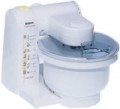Nozzles
— The main bowl. An open capacity designed for kneading dough, whipping cream and mixing masses. The main bowl is included in almost all food processors. It can be made of various materials: plastic, glass, metal, etc.
—
Blender. In this case, it is a bowl narrowed downwards, at the bottom of which there is a bladed knife. Such a device is suitable both for mixing liquids into a homogeneous mass (for example, for making cocktails or batter), and for grinding some solid foods (for example, fruits and vegetables) into a homogeneous puree. The blender is usually installed instead of the main bowl, however, there are devices that allow you to use two bowls at the same time.
—
Food processor. A special capacity for chopping, which is equipped with either a knife for chopping products, or discs for chopping, cutting, French fries. Allows you to cut salads, shred cabbage and perform a number of other operations, depending on the complete nozzles.
—
End-to-end food processor. A special nozzle for installing cutting discs. This accessory allows you to quickly chop vegetables or shred cabbage. Moreover, the final product enters the main bowl (or any other from your kitchen inventory) — there is no separate bowl like in a classic food processor.
—
Meat grinder. The possibility of using the device as a meat grinder
...— for making minced meat, grinding fruits and vegetables. In terms of possibilities, such nozzles are often not inferior to meat grinders made in the form of separate devices.
— Vegetable cutter. A special attachment for cutting vegetables, fruits and mushrooms. Depending on the type, it allows you to cut food: into cubes, slices, sticks, etc. It can be equipped with its own capacity for collecting cuttings.
- Steam cooker. Ability to use the food processor as steam cooker — for steaming food. This method of cooking is considered healthier than classic cooking, it allows you to save a maximum of vitamins and nutrients in the products. Among other things, steaming is often used in the preparation of baby food. Some food processors with this function are originally designed specifically for cooking for children.
— Grinder(for coffee). The grinder with characteristic grinding rods for grinding grains (including coffee beans), oil seed crops, cereals and pulses. It is perfect for making flour. Ussually such attachments have opportunity to adjust the grinding degree.
— Centrifugal juicer. The universal juicer for getting fruit, vegetable and berry juice. Not suitable for citrus fruits (see Citrus juicer). Note that food processor juicers are usually less performant than juicers as separate devices, and therefore are poorly suited for harvesting large amounts of juice.
— Citrus juicer. It is a rotating ledge with a ribbed surface. To get juice, you need to manually put half of the fruit on it with the flesh down and press hard. Due to this procedure, the juice from the flesh is squeezed into the bowl located below, and the peel remains intact.Power
Rated power of the food processor. Most of this power comes from the engine — the rest of the unit consumes very little energy. Usually, the
more power, the higher the productivity of the unit, and the less time it takes to process products.
Note that the optimal power value directly depends on the volume of the bowl (see the relevant paragraph): for example, for a 1.5 kg bowl, at least 300 W is desirable, for a two-kilogram bowl — 400 W, a three-kilogram bowl — at least 700 W. And with the same bowl capacity, a more powerful unit will be more productive, it will work faster and better cope with high loads (for example, a full load). On the other hand, an increase in power affects energy consumption and price.
Max. revolutions
The maximum speed of rotation of the working attachment of the food processor. The higher the rotation speed, the more solid products can be processed in a food processor, and the less (in some cases) the time to complete the desired procedure.
Main bowl material
The bowls of modern food processors can be made of plastic, glass, or metal.
The plastic bowls are the most common due to their low cost and durability. They are lightweight, resistant to falls and can withstand quite large loads, they can be both transparent and opaque. The disadvantage of plastic is an increased tendency to scratches.
The glass bowls are scratch-resistant, and they allow you to monitor the products processing through transparency. However, the glass is a fragile material, and such bowls are very sensitive to falls, shaking, and bumps.
Metal (usually stainless steel) is the strongest and most durable material. However, it is opaque, in addition, the
metal bowl usually significantly affects the cost of the device.

